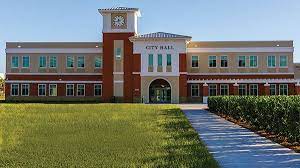The Palm Coast City Council approved a $696.4 million budget for fiscal year 2026 during a special hearing on Wednesday, representing a 65.2% increase from the previous year’s adopted budget. However, city officials emphasized that the dramatic increase stems primarily from a massive water and wastewater infrastructure investment rather than across-the-board spending growth.
Budget Breakdown and Infrastructure Focus
Budget and Procurement Manager Gwen Ragsdale presented the final proposed budget, explaining that there have been no changes since the first public hearing on September 10th. The general fund, which is funded by property taxes, accounts for $67 million or 9.7% of the total budget.
Mayor Norris highlighted the infrastructure focus during the meeting, stating, “The reason for that increase is because this council has chosen to invest in our infrastructure in a way that we haven’t done in the recent past.” He noted that out of the $67.6 million general fund, the city is “investing into our infrastructure $629 million.”
The water and wastewater utility capital fund saw the most dramatic increase, jumping from $83 million in 2025 to $326 million in 2026. Council Member Miller pointed out this significance, saying, “Despite all of the things that we were able to do, add deputies, put money into our fire stations, put money into our pension, put money into the YMCA, their economic development incentives… really the bulk of our increase is only in water and wastewater utility capital fund.”
Miller further explained that removing the utility capital expenses would actually show a decrease in other areas: “If you take out the utility, water, and wastewater utility capital fund monies, that brings you down to a budget of 370 million. Last year’s budget was 421 million.”
Millage Rate Debate and Adoption
The council faced a key decision on the property tax rate, known as the millage rate. The proposed rate of 4.0893 mills represented a 2.14% increase from the rollback rate of 4.0035 mills, which would have kept tax revenue flat despite rising property values.
Council Member Gambaro argued for the rollback rate, citing economic concerns. “Over the past several weeks, I’ve received a significant amount of input from our residents. We’ve seen our unemployment numbers climb to 5.4%. We’ve seen critical statistics outlining that over 39% of our residents are not able to pay their rent,” Gambaro said. He added that a local employer’s decision to reduce 300 manufacturing jobs and slow home sales contributed to his position.
However, when pressed by other council members about what budget cuts would be necessary to accommodate the rollback rate, Gambaro’s suggestions focused on long-term solutions. “We could have sold the golf course. We could have done a bunch of different other things,” he said, though these would not provide immediate relief for the current budget year.
Budget Manager Ragsdale confirmed that adopting the rollback rate would require cutting approximately $1 million from the budget. The council had allocated $1.5 million for targeted employee pay raises and $1.3 million for economic development incentives.
Vice Mayor Pontier questioned the wisdom of cutting employee raises, noting, “We saw in our risk management assessment that we just got back that retaining employees is already a challenge.” City Manager also expressed concerns about cutting merit-based pay programs during an ongoing salary survey.
Council Member Miller calculated the impact on individual taxpayers, noting that the difference between the proposed rate and rollback rate amounts to about $25 per year for a median household.
The millage rate of 4.0893 mills was ultimately approved by a 4-1 vote, with Gambaro casting the dissenting vote.
Public Input and Concerns
Resident Jeanie Duarte spoke during both public comment periods, expressing strong opposition to the budget increases. “Some, if not most, of these budget increases are excessive and unreasonable,” she said during the opening comments. “I urge you to vote from your own knowledge and your own conscience and not from compromise just to get things passed.”
During the millage rate discussion, Duarte supported Gambaro’s position on the rollback rate, saying, “We are suffering out there and everything’s going up. Our pockets are getting hit… we need the rollback.” She also referenced Governor Ron DeSantis’s position on tax increases, stating, “As Governor Ron DeSantis stated, if you’re not going down and you’re remaining the same or going up, you’re taxing people on unrealized gains.”
Duarte also criticized the water and wastewater projects, saying they “were not brought to the public by referendum” and calling the spending “an outrageous amount of money.”
State Road 100 Community Redevelopment Agency Budget
The council briefly recessed to reconvene as the State Road 100 Community Redevelopment Agency board. They unanimously approved a CRA budget totaling $3,336,344 without discussion or public comment.
Fleet Replacement Program
The council unanimously approved Resolution 2525, which authorizes the fiscal year 2026 fleet replacement purchase program. City staff noted that the fleet budget had been reduced by 12% from previous proposals, though Fleet Manager Matt Manel was absent due to illness.
Affordable Housing Discussion
Council Member Gambaro brought up recommendations from the Affordable Housing Advisory Committee (AHAC), specifically requesting that an accessory dwelling unit survey be reviewed by the committee before final presentation to the council. The council provided consensus for this review.
Gambaro also suggested the city examine Flagler County’s impact fee waiver policies for affordable housing projects. “This might be an opportunity to look at potentially providing some relief from the impact fees that would be in line with our efforts to provide affordable housing,” he said.
However, other council members expressed skepticism about reducing impact fees. Mayor Norris stated, “I’m very hesitant to do anything with cutting back impact fees… I won’t support that.” The council agreed to review the county’s policies for informational purposes only.
Final Budget Adoption and Other Business
Following the millage rate adoption, the council unanimously approved the final budget of $696,444,327. City Clerk was instructed to forward the millage rate resolution to the property appraiser, tax collector, and the state Department of Revenue within three days as required by law.
During the discussion period, Council Members addressed several community issues. Vice Mayor Pontieri reported on three recent traffic fatalities since Monday and urged residents to drive safely.
Mayor Norris mentioned attending a state legislative program meeting where the city presented its priorities, noting that Senator Leek emphasized the need for local matching funds for state appropriations. The city’s biggest ask is $30 million for road infrastructure improvements at a local “choke point.”
The meeting concluded with an announcement about a baby box dedication ceremony scheduled for September 30th at 3 p.m. at Fire Station 25.
The budget includes funding for additional sheriff’s deputies, fire department improvements, economic development initiatives, and employee compensation increases.
The new budget takes effect on October 1, 2025, marking the beginning of fiscal year 2026 for the city of Palm Coast.



